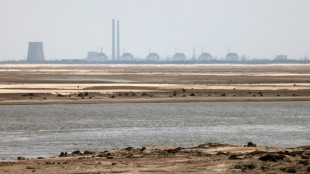-
 Arsenal strike late to beat Newcastle, close in on Liverpool
Arsenal strike late to beat Newcastle, close in on Liverpool
-
Lyon win at Lille to stay level at top of Ligue 1 with PSG

-
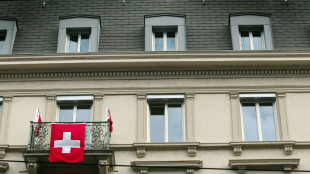 Zurich votes to ban petrol leaf blowers
Zurich votes to ban petrol leaf blowers
-
Starmer warns UK Labour in 'fight of our lives' as party meets

-
 Namibia deploys 500 soldiers to fight Etosha fire
Namibia deploys 500 soldiers to fight Etosha fire
-
Ryder Cup start host steps down after expletive-filled McIlroy chant

-
 Kuldeep helps India bowl out Pakistan for 146 in Asia Cup final
Kuldeep helps India bowl out Pakistan for 146 in Asia Cup final
-
Dominant Europe on the brink of historic Ryder Cup triumph

-
 Injured Hovland withdraws from Ryder Cup as Europe moves closer to win
Injured Hovland withdraws from Ryder Cup as Europe moves closer to win
-
Roma beat Verona to join Napoli at Serie A summit

-
 Watkins sparks Aston Villa revival for first Premier League win
Watkins sparks Aston Villa revival for first Premier League win
-
Pogacar defends cycling world title with solo run

-
 No handshake again as India bowl against Pakistan in Asia Cup final
No handshake again as India bowl against Pakistan in Asia Cup final
-
Zverev downs racket-smashing Moutet in Beijing as Gauff digs deep

-
 Leverkusen's Schick set for spell on sidelines
Leverkusen's Schick set for spell on sidelines
-
Massive Russian missile and drone barrage kills four in Kyiv

-
 Indian actor-politician's aides charged after rally stampede kills 40
Indian actor-politician's aides charged after rally stampede kills 40
-
England still have 'another peak to climb' after Women's Rugby World Cup triumph

-
 Real Madrid's Carvajal Clasico doubt after calf injury
Real Madrid's Carvajal Clasico doubt after calf injury
-
Moldova votes in tense polls, torn between EU and Russia

-
 Alcaraz makes light of injury to reach Japan Open semis
Alcaraz makes light of injury to reach Japan Open semis
-
Slips, salt and stripes: key looks from Milan fashion week

-
 Gauff digs deep to keep China Open title defence alive
Gauff digs deep to keep China Open title defence alive
-
Russian missile and drone barrage kills four in Kyiv

-
 Massive crowd, chaos preceded deadly India rally stampede
Massive crowd, chaos preceded deadly India rally stampede
-
Russian missile and drone barrage kills four: Kyiv

-
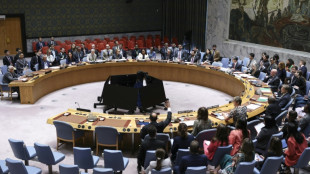 Iran denounces 'unjustifiable' return of UN sanctions
Iran denounces 'unjustifiable' return of UN sanctions
-
Emotional Marquez in tears after winning seventh MotoGP title

-
 Emotional Marquez win seventh MotoGP world championship
Emotional Marquez win seventh MotoGP world championship
-
Russia pounds Ukraine with 'hundreds' of drones and missiles: Kyiv

-
 Wallabies record-holder Slipper hints Perth could be final Test
Wallabies record-holder Slipper hints Perth could be final Test
-
Son brace fuels LAFC as Messi frustrated in Miami draw

-
 US actress-singer Selena Gomez weds music producer Benny Blanco
US actress-singer Selena Gomez weds music producer Benny Blanco
-
Pakistani parents rebuff HPV vaccine over infertility fears

-
 Women's cricket set for 'seismic' breakthrough at World Cup
Women's cricket set for 'seismic' breakthrough at World Cup
-
New Zealand fly-half Barrett out of Australia rematch

-
 Moldovans torn between pro-EU and pro-Russia vote in tense polls
Moldovans torn between pro-EU and pro-Russia vote in tense polls
-
Strings of identity: Kashmir's fading music endures

-
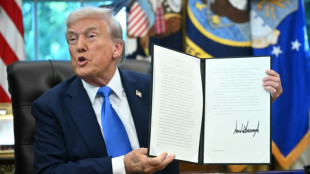 'Clog the toilet' trolls hit Indian visa holders rushing to US
'Clog the toilet' trolls hit Indian visa holders rushing to US
-
Bradley: USA Ryder Cup disaster part of why crowds angry

-
 Europe used 'anti-fragile mentality' to cope with Cup hecklers
Europe used 'anti-fragile mentality' to cope with Cup hecklers
-
Unbeaten McIlroy faces winless Scheffler in Ryder Cup singles

-
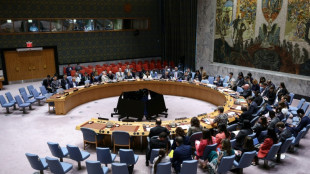 Sweeping UN sanctions return to hit Iran after nuclear talks fail
Sweeping UN sanctions return to hit Iran after nuclear talks fail
-
Messi, Miami frustrated in Toronto stalemate

-
 Argentina protesters march for victims of live-streamed femicide
Argentina protesters march for victims of live-streamed femicide
-
Europe shrugs off intense abuse to reach brink of Ryder Cup win

-
 Injury-hit PSG reclaim Ligue 1 top spot ahead of Barcelona clash
Injury-hit PSG reclaim Ligue 1 top spot ahead of Barcelona clash
-
Understrength PSG reclaim Ligue 1 top spot ahead of Barcelona clash

-
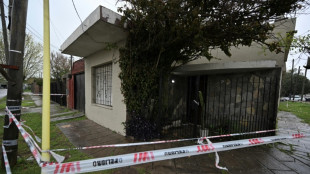 Argentina protesters seek justice for victims of live-streamed femicide
Argentina protesters seek justice for victims of live-streamed femicide
-
Palhinha rescues point for Tottenham against winless Wolves

UK hands health service major spending boost
Britain's Labour government on Wednesday said it was injecting the struggling National Health Service with a "record" £29-billion ($39-billion) annual boost, as it looks to cut spending on its asylum programme.
Finance minister Rachel Reeves set out her much-anticipated Spending Review to grow the UK economy, which faces pressure from US President Donald Trump's tariffs onslaught.
"We are renewing Britain," Reeves told parliament as she announced increased day-to-day spending, adjusted for inflation, to key departments from energy to education.
But Prime Minister Keir Starmer's government said it will "cut the asylum backlog" and end the use of hotels to house asylum seekers, to save £1 billion annually.
Amid the Russia's war in Ukraine, Reeves confirmed defence spending -- including on intelligence services -- will rise by 2.6 percent of economic output by 2027, helped by cuts to international aid.
"A new era in the threats we face demands a new era for defence and security," she told MPs.
These spending increases forced other key ministries to tighten their belts, with cuts to the foreign office and transport departments, adjusted for inflation.
Reeves had already announced major cuts to public budgets in recent months amid tight fiscal conditions.
Since Labour won power last July, ending years of rule by the Conservatives, it has scaled back disability welfare payments, hoping to save more than £5 billion by 2030.
- Balance the books -
Reeves, whose official title is chancellor of the exchequer, has amended her fiscal rules to allow the government more headroom for investment in the run-up to the review.
At the same time, she is looking to balance the books so that tax revenues match day-to-day spending, meaning the government borrows only to invest.
The minister has allowed the Treasury to borrow more, particularly for infrastructure projects across the vital housing and energy sectors.
This has handed her a windfall of £113 billion over five years.
Reeves needed to "balance the books by making cuts to unprotected department budgets", said Joe Nellis, economic adviser at consultancy MHA.
While Britain's economy grew by a better-than-expected 0.7 percent in the first quarter, analysts cautioned that solid expansion was unlikely to be sustained.
"If growth fails to emerge, then she (Reeves) will either have to cut further areas of public sector spending or raise taxes again in this year's Autumn Budget," said Nellis.
Reeves, in her inaugural budget, raised a business tax, which is starting to impact on unemployment and wages growth.
Ahead of the review, the government pledged billions of pounds for Britain's nuclear industry -- including the new Sizewell C power plant -- plus £86 billion for science and technology by 2030 and more than £15 billion for public transport in England.
- U-turns -
Reeves confirmed £39 billion for a programme to build affordable homes over the next 10 years, and plans to deliver 1.5 million homes.
The review also included an investment of up to £750 million on a new national supercomputer in Edinburgh.
Labour on Monday U-turned on a policy to scrap a winter heating benefit for millions of pensioners following widespread criticism, including from within its own party.
L.Stucki--VB

